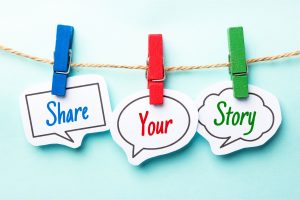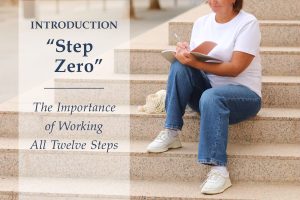In program, I had to learn to be uncomfortable.
I don’t just have an eating disorder, I have a living disorder.
I don’t ever remember having a normal relationship with food. Food was my anti-anxiety drug, my friend, my lover, and my higher power. Throughout my life, I was a chronic dieter, and I played around with bulimia. I have exercised past the point of exhaustion and tried starvation, and I underwent gastric bypass surgery. At my heaviest, I was nearly 300 pounds (136 kg), and I’m only 5 feet 1 inches (155 cm) tall, so that is a lot of body mass on such a small frame. My thinnest weight got me hospitalized. Regardless of what I weighed, I was “malnourished” because I was starving for something that take-out food could not provide. What I wanted couldn’t be found in a box, bag, bottle, batch, bin, or bucket. I was longing for a deeper nourishment that I could not name.
I came to Overeaters Anonymous in my early 20s hoping to find the right diet. I lost some weight and then I left the program. I was looking for an external solution to an internal problem, so I had no interest in attending meetings, and I certainly felt no need to work the Steps or grow my spirituality. I continued to diet and struggled with my weight, depression, food obsession, and sugar addiction for many more years. I remained in the throes of my addiction; it had a stronghold on me physically, mentally, and spiritually. I was a hopeless case. My body was unhealthy, and my mind was unhinged.
Then in October 2008, for reasons I can only explain as a God-inspired idea, I decided to return to OA. I got abstinent four days before Halloween. I’ve been abstaining from “alcoholic foods” and compulsive behaviors (not just limited to food) one day at a time since then. This is a miracle because, before OA, I couldn’t string together 16 hours or 16 days, let alone 16 years.
This astounding journey sounds like it came so easy, but it has not been without challenges. I’ve had many losses and disappointments in recovery, but they were never an excuse to overeat. No matter what you weigh, I promise your life will offer challenges. You’ll wait in lines, cars and computers will break down, bosses may not recognize your skills, skin will sag, children may move away, and loved ones will die. But overeating will not fix any of those experiences.
When faced with difficulties, I ask myself three things . . .
In program, I had to learn to be uncomfortable. You see, I am always at a crossroads: I can go on eating compulsively or I can surrender, and either way, I might be uncomfortable. I knew the pain of compulsive eating, but I wasn’t sure I could withstand the sometimes-distressing moments in recovery. When faced with difficulties, I ask myself three things:
- What is God’s will for me in this unpleasant moment?
- What do I want, really want. (Chances are it is not food.)
- Do I trust my Higher Power enough to accept the outcome?
I’ve heard it said that we addicts often get our physical appetites mixed up with our spirit hunger. I no longer look for meaning in a box, bag, bottle, batch, bin or bucket. It’s not there. It never was. There’s a deeper hunger that longs to be fed, but I cannot do that without the Fellowship and my Higher Power. Spiritual food changes the whole recovery landscape when we get honest and abstain from our compulsive behaviors.
I need the structure of this program, and I need a food plan that is truly unique to me. Since I have a disease of “more” and “never satisfied,” I weigh and measure three carefully curated meals. They were created with the help of a registered dietician. She compares the ideal food plan to going on a journey wearing sneakers and a sweatshirt—because you wouldn’t wear stilettos and a straitjacket on a hike! Of course, my recovery also includes working the Steps to the best of my ability and fostering a deeper relationship with the God of my understanding.
The abstinent OA way of life has allowed me to enjoy a peaceful relationship with food and my body because I had the willingness to develop a relationship with my Higher Power. The food was just a symptom of my unmanageable life. As our literature states, “Spiritual, emotional and physical recovery is the result of living the Overeaters Anonymous Twelve Step program” (Business Conference Policy Manual, 1988b, amended 2002, 2009, 2011, 2019, and 2021).
The abstinent OA way of life has allowed me to enjoy a peaceful relationship with food and my body because I had the willingness to develop a relationship with my Higher Power.
My prayer is that you find serenity in the surrender and get comfortable with being uncomfortable, especially when facing the proverbial fork in the road. We have each other and we have Twelve Steps to guide us as we “trudge the Road of Happy Destiny” (Alcoholics Anonymous, Fourth Edition, p. 164). I hope you’ll use the Steps as your map and your GPS—God’s Powerful Spirit—on your recovery journey. Enjoy the ride!
—Kara M., Rhode Island USA





